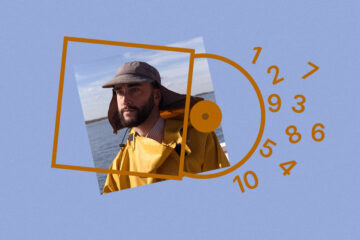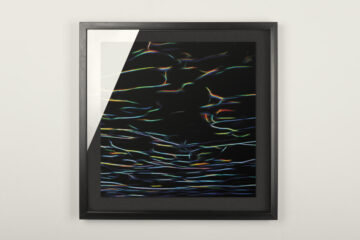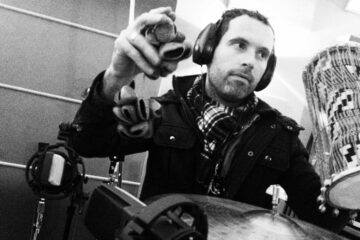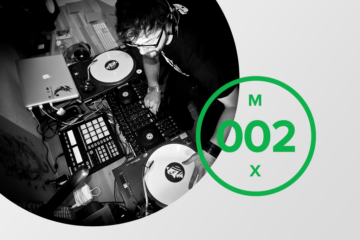Whether on records by Thundercat, in the band Flying Lotus or for beats by MF Doom – Dorian Concept launches into the keys. The Viennese musician used to calm his »nervous left hand« by playing on his Playstation, today it dances over the keyboard for labels like Ninja Tune and Brainfeeder. Meanwhile, the fourth album from the »hobbyist songmaker«, as Dorian Concept likes to call himself, has now been released. On »What We Do For Others« the synthesizers no longer sound as if they suffer from ADHD, but his speed skills on the keys do still shine through.
Your last album »Nature of Imitation« was pure maximalism. In contrast, »What We Do For Others«, your current record, sounds almost … gentle.
Dorian Concept: It’s a step away from the in-your-face maximalism which I’m sometimes associated with. I long for an everyday life that finds wonder in the absence of excitement. That’s why I highlight the quiet moments with »What We Do For Others«. It is a nocturnal album.
Because it’s emptier?
My approach to playing the keyboards has changed. On »Nature of Imitation« I often played very short segments and strung lots of loops together, which created collage-like compositions. On the current album, I play long takes – with four or five synthesizers and a Korg workstation. I was groping around in the dark to see what could come out of these long arrangements.
And?
I no longer felt the need to emphasise technique and focus on proving my own abilities, but just to make soulful music.
It was something like that in the band from Flying Lotus, wasn’t it?
Yes, he had faith in what made sense to the band members’ ears. Still, I never just improvised and nothing else. Nowadays, I prefer to think of myself as a hobbyist songmaker who uses the keys as a means of programming. I don’t need the mouse for editing if I can use the keyboard to get into the flow. For that, I sometimes have YouTube videos running in the studio over which I play. In retrospect, you realise that distraction can bring an exciting layer to your game.
«Die Art, wie ich heute Synth spiele – mit wenig Harmonie und Akkorden, dafür mehr Melodie – ähnelt dem Ausdruck eines Saxophonspielers.«
Dorian
You need to distract yourself from your own technical skills?
As a teenager I felt driven towards the technical – polyrhythms, seven-eighths beats, that’s what I wanted to learn. The music sounds like it. For the first time, »Nature of Imitation« came about less from learning than from the freedom to come up with weird ideas. Nothing has changed since then, quite the opposite, in fact: I try to think less and less when I make music. That’s why »Nature of Imitation« and »What We Do For Others« are like siblings.
Perhaps muscle memory is a good term to describe your freedom. Your body has internalised the technique, so you can use it freely without thinking about it.
I mastered these skills by being persistent as a teenager. I’m still very grateful for that – and also a little surprised. After all, there were no musicians in my family to point me in the right direction. Nevertheless, when I was 15 I wanted nothing other than to make music, maybe because at that time and at school I was hardly interested in anything else.
You were at school with…
…Cid Rim and The Clonius, right? We were interested in the interface between electronic music on labels like Warp Records or Ninja Tune and instrumental jazz music, but also hip-hop and funk. We DJ’d, learned instruments and produced.
Your first instrument was not the piano, but the saxophone, correct?
When I heard Coltrane’s »After Blue«, I just knew: I want to play soprano sax! The way I play synth today – with less harmony and chords, but more melody – resembles the expression of a saxophone player. What you normally do with your mouth, I do with the pitch wheel and modulation. That’s why some people think they can really hear flutes on the recordings, but they are actually synths! What I notice, though, is that my music transforms back into the aesthetics of wind instruments. I’m fascinated by extended techniques – the moment when you hack the instrument and it doesn’t spit out normal sounds any more.

Watching you, people hear and see that you’ve hacked the synth, but how did you go about doing that?
Well, I’ve never unscrewed them and re-soldered the cables or anything like that. For me, it was more about the aesthetics. For example, a random modulation can be running while I’m playing – so everything sounds a bit out of tune. Meanwhile, I work the pitch wheel slightly to create arbitrary microtonalities. A synthesizer can be manipulated like the keys on a saxophone.
You imitate the technique and transfer it to a new instrument.
My friends and I used to play Mortal Combat on Playstation. You had to memorise complicated combos on the controller – and execute them with one thumb. It may sound funny, but, I’ve drawn a lot from that for my playing.
That is the hack: You change the context around the application!
In video games, there is a competitive component that takes place subconsciously. The small milestones are important for learning a technique. It is no different with modulation. Earlier, I used to call it my »nervous left hand«. In the meantime I see it as a dance, the steps of which I no longer perform consciously. I don’t practise any more either, except when I’m making music anyway. What I used to see as sketches, I now understand as something that comes from a deeper place within me.
You highlight the sketch…
… because art precedes man and his knowledge. I recognise that from my career path. My first release was in 2004, and I’ve been around internationally since 2007. Still, I’ve never made music to be successful. Rather, it emerged from an inner drive. I had to make the music for myself.
»Failure is like a bad date – you remember it, because it’s a good story.«
Dorian
You never wanted to be successful, but you play keyboards for FlyLo or MF Doom. Another person might have pushed on in that direction only never to arrive, you may have already been there before you even knew it.
That is why objectives in the outside world can also turn out to be dead ends. The intention changes, the approach to music becomes different if you want to be successful. In contrast, you have to nourish the parts within yourself that lead back to the original interest – or at least seek them out.
And did you find something?
I have asked myself the question so many times that it now feels clearer. With »What We Do For Others« I’m not as uptight as I used to be. It is a companion album that focuses on its own process of creation.
The songs reflect the mood you were in at the time they were written.
I never wanted to talk about feelings in my music because I don’t want to conform to any clichés. For the new album, however, I also drew from strange feelings. These were inner journeys that guided me through the ruins of my own expectations. Perhaps these journeys show themselves most powerfully in the sparse numbers. They move away from the euphoria to outside places that have already been abandoned.
By doing so, you break with expectations.
The outside world needs an anchor. I cannot exclude myself from this, because I also associate certain people with certain qualities. Nevertheless, one can still break with expectations. »Selected Ambient Works« by Aphex Twin had little to do with »Come To Daddy«, which he later produced. It is a game between polarities. My releases are meant to function in a similar way, they are counter-movements to what has gone before.
You provoke the surprise.
That’s why I recently went on stage with just a Roland SH-101 and a looper, building the songs live – without a prefabricated path, but with the potential to surprise myself. I always think of that Futurama episode where Bender comes to God who tells him, »When you do things right, people won’t be sure you’ve done anything at all.«
The failure…
…ist allzu menschlich. Es ist wie ein schlechtes Date – man merkt es sich, auch weil es eine gute Geschichte ist!
How has this thinking changed for you, from your early beginnings, through recording for MF Doom and live performances with FlyLo, to your current album?
I was on the studio team at the Red Bull Music Academy in Montreal with Thundercat in 2016. He is an incredibly precise bass player, we created a track together. Because of the challenge I wanted to play as tight as he did, but I noticed that my playing always floats a little. Thundercat said back then: »That’s you!« In the meantime, I can embrace my own off-ness, my own feeling for melody and timing, in other words, my idiosyncrasies while playing much more strongly than before. After all, it’s like developing your personality: You get older, it’s best to come to terms with the way you are. What I once considered a deficit, I now recognise as a unique feature of myself.










